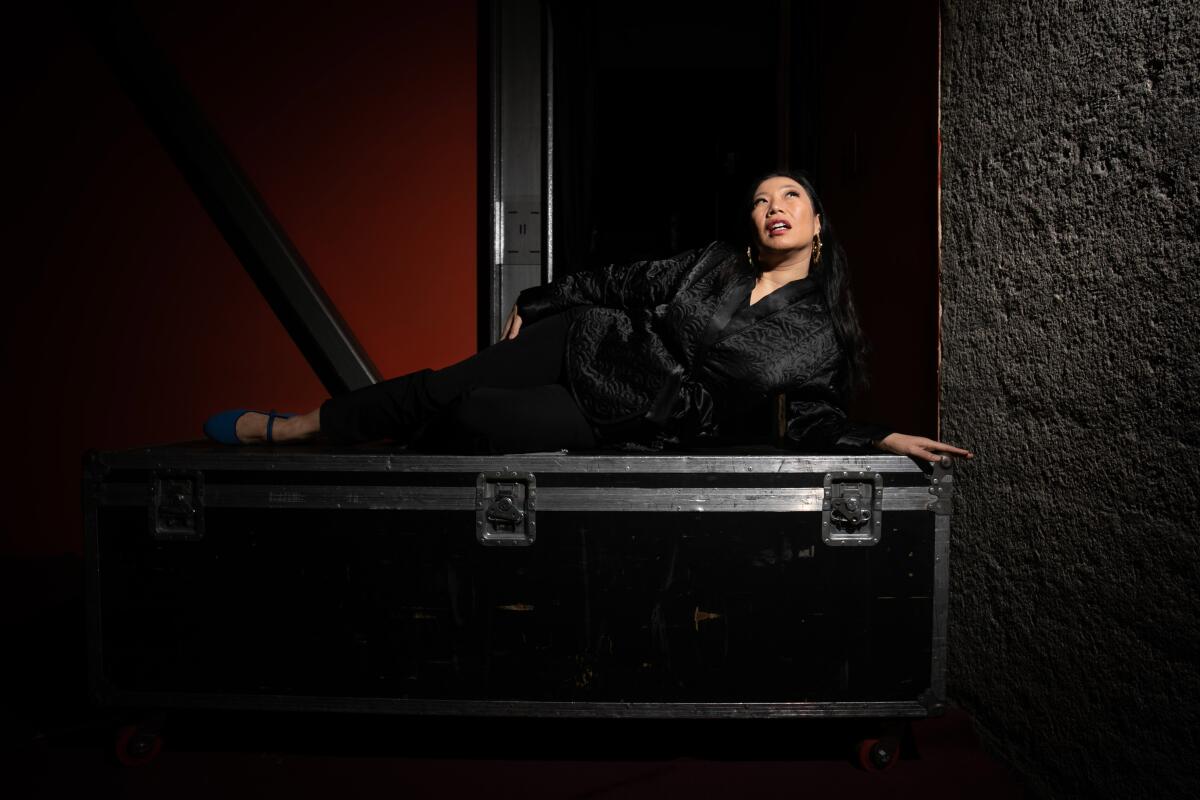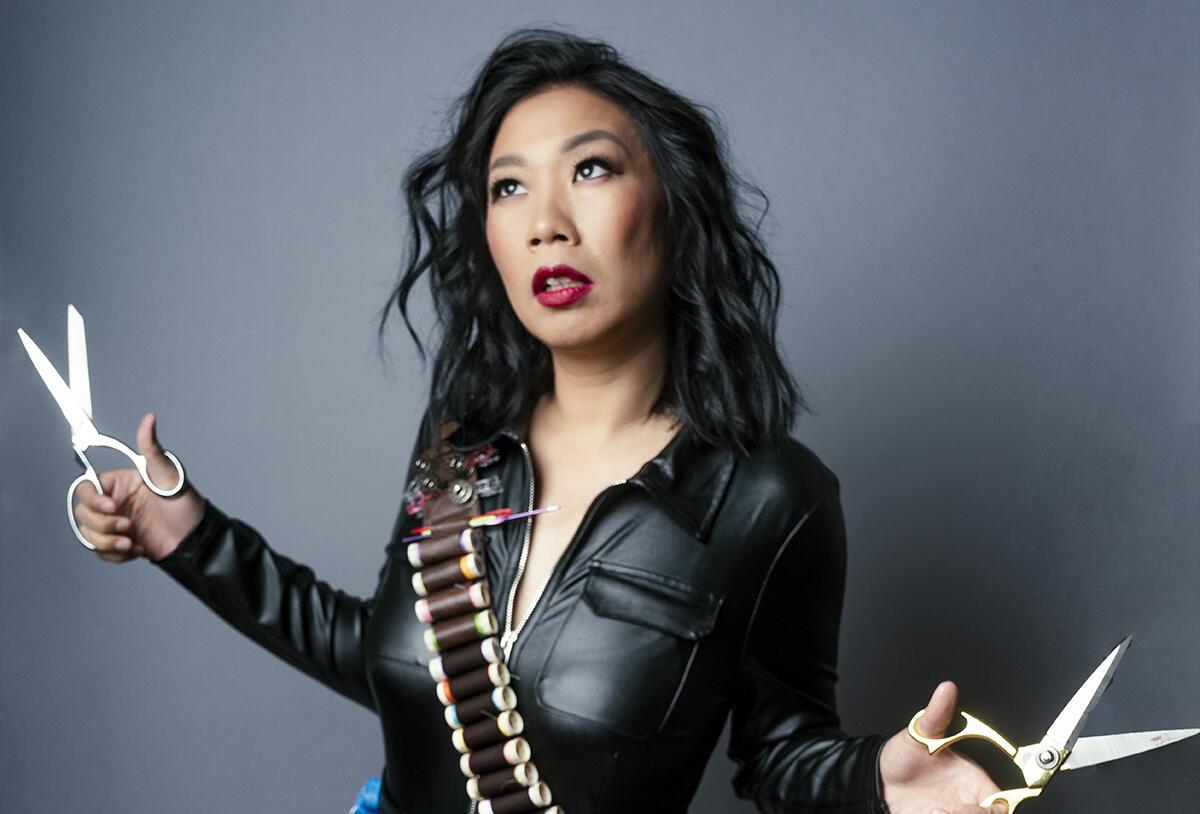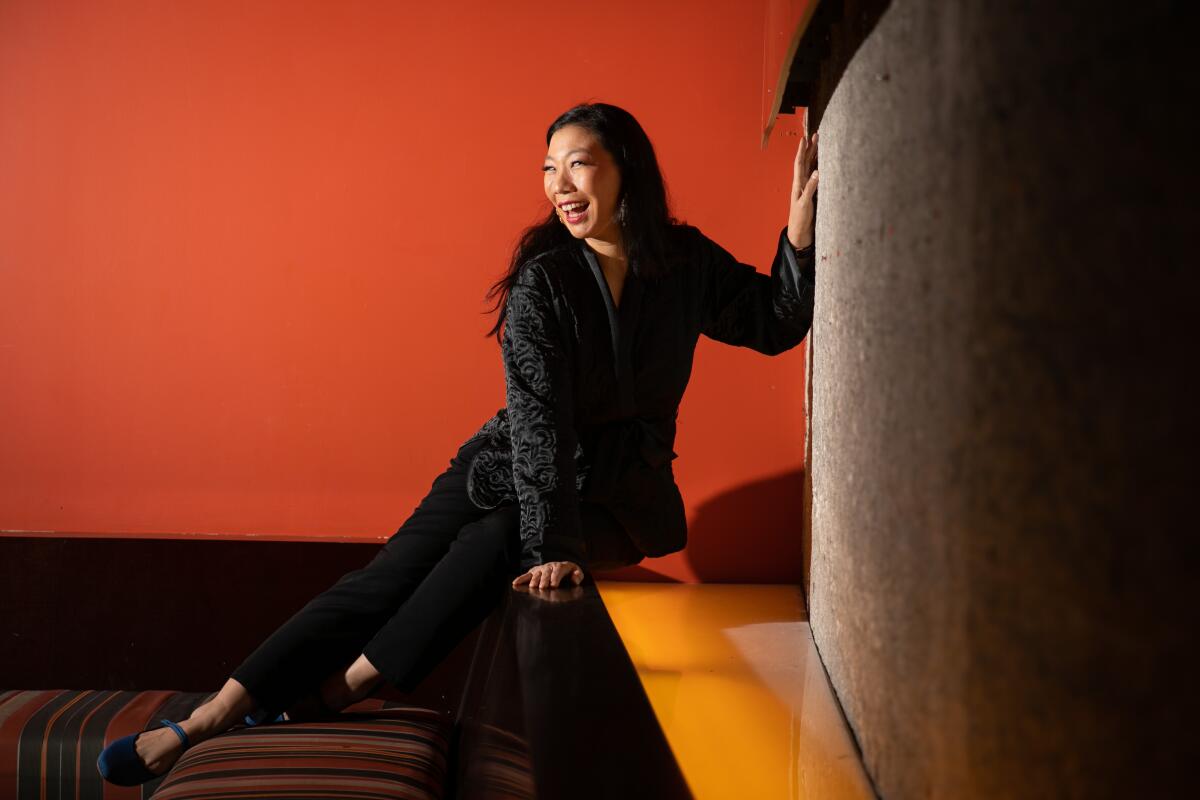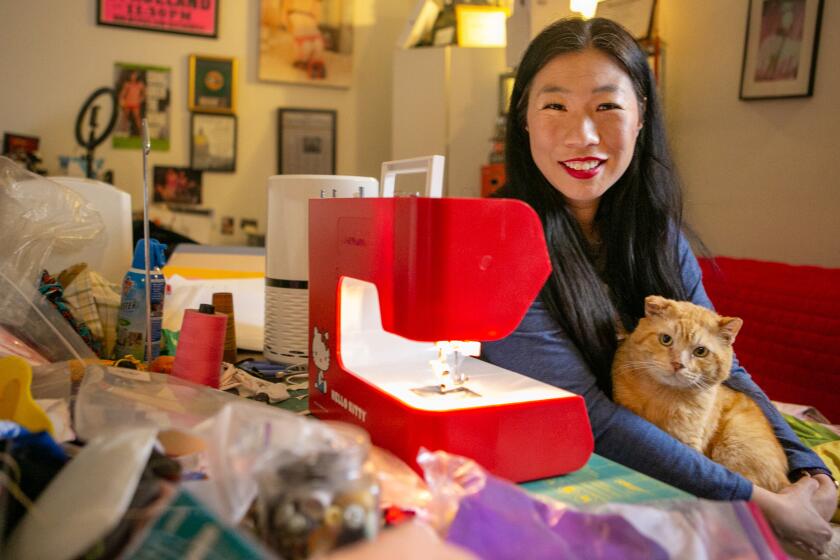This comedian just won a $550,000 prize. Up next: A boundary-pushing Culver City show

Part of the world may have moved on from COVID-19, but performance artist Kristina Wong is reliving the worst of the pandemic — specifically the dark days of 2020 through the summer of 2021 — night after night as part of her solo show, “Kristina Wong, Sweatshop Overlord,” playing at Kirk Douglas Theatre through March 12.
The show, a co-production between Center Theatre Group and East West Players, was born out of Wong’s experience forming a group called the Auntie Sewing Squad — a collective of mostly Asian women who organized through Facebook to sew masks for at-risk individuals, front-line workers and vulnerable communities during a time when masks (and the protection they afforded) were incredibly hard to find.
On Monday night, the comedian and social justice activist received the ultimate honor for her efforts when she became one of six recipients of this year’s Doris Duke Artist Awards— a no-strings-attached prize of $550,000.
During an interview at the theater, shortly before previews for “Sweatshop Overlord” were about to start, Wong recalls how radically high-stakes the whole mask endeavor seemed at the time: “I’m suddenly feeling the weight of saving the entire world with a sewing machine.”
In the midst of this all-consuming activity — the group grew to include more than 800 participants across 33 states who sewed and donated more than 300,000 masks — it never occurred to Wong that the endeavor would turn into fodder for her next show. She balked at the idea when friends mentioned it.
“No! We’re all living through this, why would we want to do this again? You want to watch this again? I don’t want to watch this again,” Wong says.
What she felt several years ago turned out to be prescient.
A year ago, performance artist Kristina Wong started a Facebook group called the Auntie Sewing Squad to get people to help sew COVID-19 masks.
Americans may obsess over the apocalypse as it’s depicted on television — binging zombie end-of-civilization tales such as “The Last of Us” and “The Walking Dead”— but they often practice an odd avoidance when it comes with the world’s real-life brush with the End Times. Art about the pandemic is hard to find, and when the crisis is addressed in popular culture, it’s usually glazed over with a single line, always uttered in the past tense.
Nonetheless, Wong wrote about her sewing-group work in real-time and performed bits of it on Zoom, and as part of COVID-era streaming performances. In September 2021, New York Theatre Workshop asked to open its first post shutdown season with the show, and before she knew it Wong was a 2022 Pulitzer Prize finalist for drama.
The critical response, says Wong, has been all the more remarkable because — like the general public — artistic gatekeepers are also actively shunning pandemic storylines. Wong feels like she slid in at just the right time and speculates that if she were shopping the show around now, she would have a hard time finding a theater that would want to take a chance on it.
“Every single human being on this planet was impacted by it,” Wong says of the pandemic. “And it’s just so strange that there isn’t any work on it. I think there is this expectation that all the reflections are going to be really depressing and overwrought and sad.”
But that’s not Wong‘s approach. Although “Sweatshop Overlord” takes on weighty themes of life and death, class and privilege, the harm done to Black, Native and Asian Americans during the pandemic and how humanity’s mutual peril drove a wedge between us rather than binding us together with love — Wong manages to approach the heaviness with her trademark dry wit and irreverent brand of humor.

Plus, she does not think of “Sweatshop Overlord” as a pandemic show — but rather as a meditation on the power of community that she discovered through her sewing project.
The virus made it apparent how deeply connected we are to other human beings, but Wong says that somewhere along the way we lost the ability to relish what that connection could be.
“By remembering, we have a chance to recover that small window to ask, ‘What could we have done differently?’” Wong says. “I’m afraid that maybe we are leaving this more pissed off, more bitter, more jaded, more angry. More exhausted, which is all valid, right?”
But there could be an opportunity to figure out how we could have supported each other better.
“That, to me, is what the possibility of this piece is,” Wong says.
Center Theatre Group enters the digital performance sphere with Kristina Wong’s solo show, ‘Kristina Wong for Public Office.’
At the end of the show, she poses three questions to the crowd: “Who helped you survive this? What do you hope for as we move forward? And will you be generous and more in times of crisis?”
Audiences are responding to that ethos, she says. She can hear it in the audible gasps of onlookers as she parses a moment in the pandemic that they had forgotten.
“The big feedback I get is, ‘Wow, I didn’t realize how much we just never stopped to process and remember,’ and ‘I can’t believe we lived through all that’,” Wong says, shaking her head and laughing. “But I remember. I was writing it all down. And I’m glad I did.”
Wong, 44, has been writing it all down — and performing — in various ways and on various platforms since the aughts when her 2006 show, “Wong Flew Over the Cuckoo’s Nest,” which ran for eight years, established her satirically incendiary voice as she explored mental illness among Asian American women.
Her performance art is often meta in nature, commenting on itself in real time, a process that affects the outcome of the work itself. In 2018, she started campaigning for public office as part her act and ended up being elected to the Wilshire Center-Koreatown Neighborhood Council. It’s a largely volunteer role, but one that she uses to effect valuable change, including advocating for portable toilets and handwashing stations for the neighborhood’s unhoused population.

In November 2020, she took to the stage at Kirk Douglas Theatre with a streaming show about her political exploits titled “Kristina Wong for Public Office.” Times theater critic Charles McNulty noted that her, “energy is miraculous” and called her “marvelous company.”
McNulty is far from alone in his praise. Maurine Knighton, chief program officer at the Doris Duke Foundation, summed up the admiration of the foundation’s nominators and selection panelists.
“Folks talk in equal measure about the importance of what she does, but also the excellence of what Kristina does — the originality of the way she thinks, develops and performs her work,” says Knighton, adding that Wong is at the kind of inflection point in her career that the foundation looks for in an artist. “This is Kristina’s moment to have her work supercharged.”
The cash that comes with the coveted honor will indeed give Wong the freedom to create in an environment unfettered by the financial angst typical of the working artist. And that’s the whole point, says Knighton.
“We believe that as professionals, performing artists should have that kind of support, to create the optimal set of conditions that help them bring into being things that did not exist before. but by which we’re all enriched,” she says.
For Wong, this means setting aside her side hustles —like selling used clothes on Poshmark.
“I can actually dream much bigger and think about bigger projects,” she says.
The money will likely go toward retirement savings, so she doesn’t have to worry about that part of things. It’s a huge relief.
“The way I’ve had to survive the last 44 years of my life has always been unsure,” she says. “Always feeling like I’m walking on a floor and just hoping it appears out from under me.”
‘Kristina Wong, Sweatshop Overlord’
Where: Kirk Douglas Theatre, 9820 Washington Blvd., Culver City
When: 8p.m. Tuesdays through Fridays; 2 p.m. and 8 p.m. Saturdays; 1 and 6:30 p.m. Sundays
Cost: Starting at $30
Contact: centertheatregroup.org
Running time: 90 minutes with no intermission
More to Read
The biggest entertainment stories
Get our big stories about Hollywood, film, television, music, arts, culture and more right in your inbox as soon as they publish.
You may occasionally receive promotional content from the Los Angeles Times.












